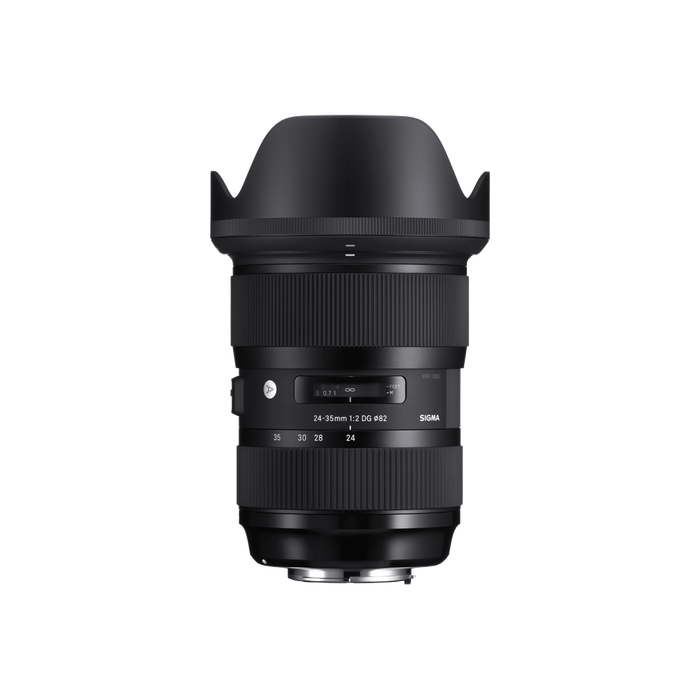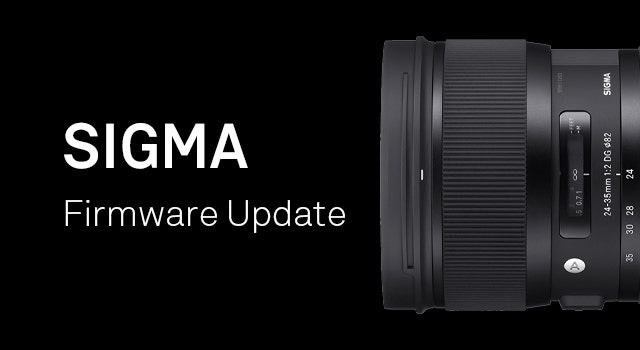24-35mm F2
DG HSM


- The world's first F2 full-frame wide-angle zoom
- One lens does the work of three prime lenses
- Attractive bokeh effect at wide apertures
- Minimum focusing distance of just 28cm
- Maximum magnification ratio of 1:4.4
- Breathtaking image quality at all focal lengths
- HSM (Hyper Sonic Motor) delivers high AF speed
- Inner focusing system
- Super Multi-Layer Coating reduces flare and ghosting
- Rounded 9-blade diaphragm
- Made in Japan
AWARDS
|
TIPA AWARD |
2016 |
| Angle of view | Standard |
|---|---|
| Camera Type | DSLR |
| Lens Mount | Canon EF-mount, Nikon F, Sigma SA |
| Sensor Size | Full Frame |
| Construction | 18 Elements in 13 Groups |
| Angle of view | 84.1º - 63.4º |
| Number of diaphragm blades | 9 (rounded diaphragm) |
| Minimum aperture | F16 |
| Minimum focusing distance | 28 cm |
| Maximum magnification ratio | 1:4.4 |
| Filter diameter | 82mm |
| Dimensions (diameter x length) | Canon EF ⌀ 87.6 x 122.7 mm |
| Weight (g) | Canon EF 940 g |
| Edition number | A015 |
| Supplied Accessories | Lens Hood LH876-03, Front Cap LCF-82mm III, Rear Cap LCR II, Case LS-588L |
| Accessories | WR Ceramic Protector Filter 82mm, WR Protector Filter 82mm, C-PL Filter 82mm, USB-dock UD-01, Mount Converter MC-11, Mount Converter MC-21 |
| EAN-code | Canon EF 085126588540 |
| Specifications Info | All figures calculated by SIGMA SA mount. * The appearance, specifications, and the like of the product are subject to change for improvement without notice. |
High-precision, rugged brass bayonet mount
The brass mount combines high precision with rugged construction. Its treated surfaces and enhanced strength contribute to the exceptional durability of the lens.
HSM (Hyper Sonic Motor)
The Hyper Sonic Motor (HSM) is an original Sigma development that uses ultrasonic waves to drive the autofocus mechanism. Its extremely quiet operation helps avoid disturbing photographic subjects. High torque and speed assure rapid autofocus response. Sigma uses two types of HSM: ring HSM and micro HSM. The Ring HSM configuration permits manual fine tuning of focus (manual override) by turning the focusing ring after autofocus is complete.
Rounded diaphragm
The polygonal shape of a conventional iris dia phragm causes out-of-focus light points to appear polygonal. A rounded diaphragm is designed to pro duce rounded out-of-focus light points when opened to near maximum aperture. This creates attractive bokeh effects in many situations, such as when pho tographing a subject against an out-of-focus surface of water from which light is being reflected.
Exclusive low-dispersion glass
The degree to which light is refracted by glass depends on the light's wavelength. This fact causes different colors of light to focus at slightly different points. The result is chromatic aberration, the color fringing that is particularly noticeable in telephoto lenses. Most chromatic aberration can be removed by combining a high-refractivity convex lens element with a low-refractivity concave element. Yet residual chromatic aberration known as "secondary spectrum" may still remain. To minimize this secondary spectrum, which can be a serious issue with conventional lenses, Sigma lenses feature up to three types of exclusive low-dispersion glass offering superior performance: ELD (Extraordinary Low Dispersion), SLD (Special Low Dispersion) and FLD ("F" Low Dispersion). In particular, FLD glass offers ultra-low dispersion in combination with high transmittance and the anomalous dispersion characteristics of fluorite. Meticulous deployment of these types of exclusive low-dispersion glass and optimization of power distribution gives Sigma lenses superlative image rendition undiminished by residual chromatic aberration.


